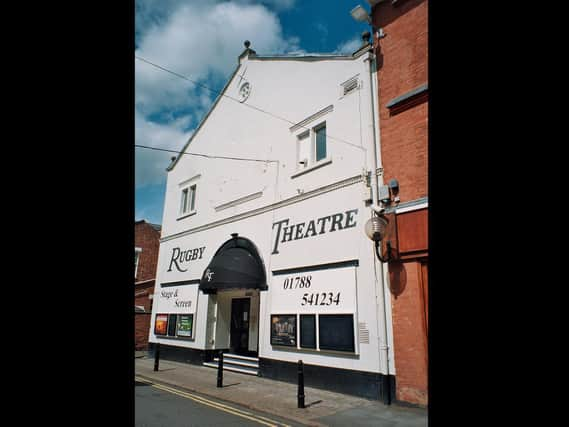Former Advertiser reporter remembers award-winning Rugby actor best known for his police chief role


One afternoon during the late 1960s, I suddenly became aware of coming under the gaze of Rugby Advertiser chief reporter Len Archer’s beady blue eyes.
“Boy – what are doing at the moment?” Uh-uh, I thought. He can’t allow me a single second of free time, can he?
Advertisement
Hide AdAdvertisement
Hide Ad“Nothing right now, Mr Archer,” I said, resignedly. “You will see that I’ve just dropped the Newbold golden wedding piece into your tray.”
What’s the old duffer got in store for me now, I wondered.
Len rose abruptly from his chair. “Right. You can help me shift this blocks cabinet. We need to get it down the stairs and into the street ready for the skip which arrives tomorrow morning.”
Blocks. Let me explain. Back in the days when typewriters strode the Earth and computers were a mad daydream in an even madder scientist’s brain, blocks were lumps of wood with metal type or images attached.
When they came into contact with ink, this was once how newspapers were printed. The technology hadn’t really changed since Caxton had been in short doublets and hose.
Advertisement
Hide AdAdvertisement
Hide AdBut there was something special about this particular blocks cabinet. For in one of the corners, were the clearly written autographs of three former Advertiser reporters – John Lawson, Frederick Friend and Harry Pigott- Smith.
The names, carefully inscribed in blue ink, were dated 1933. There they were, brothers-in-arms, young reporters standing together on the thresholds of their lives and careers.
And so it would come to pass. John Lawson was eventually appointed editor of the Advertiser, while Freddy Friend became the Leicester Mercury’s correspondent in Rugby.
Harry Pigott-Smith would eventually go on to become editor of the Stratford-upon-Avon Herald and also… the father of Tim, one of this country’s best-loved actors.
Advertisement
Hide AdAdvertisement
Hide AdTim came into the world in Rugby on May 13, 1946, and his death in April, 2017, brought to an end one of the most illustrious acting careers of recent times.
He was perhaps best known for his role as vicious police chief Ronald Merrick in the 1980s series The Jewel in the Crown, for which he won
The British Academy Television Award for Best Actor in 1985.
But this was just one accolade achieved in a working lifetime that saw him appear in many TV dramas and films.
Advertisement
Hide AdAdvertisement
Hide AdThe stage was probably in his blood. His father Harry and mother Peggy were members of a group of amateur thespians who founded Rugby Theatre in 1949. Among their number was my father, who appeared in the theatre’s first production Fisherman’s Rest, performed that same year.
As for Harry, he spent several years editing newspapers in Africa before returning to Warwickshire to take over the editorship of the Herald at Stratford.
It was during this time that he employed my future wife as a reporter on the paper. Whoever coined that well-worn phrase about it being a ‘small world’ was absolutely right.
Tim started on his road to eventual national recognition by appearing for a season during the early 1970s at the Royal Shakespeare Theatre, treading the boards in the Bard’s home town.
Advertisement
Hide AdAdvertisement
Hide AdAs you can imagine, Harry was immensely proud of his son. “My son’s an actor,” he would announce for the slightest excuse to all and sundry.
Harry had nearly reached his century before he died, but Tim was tragically not to make old bones, passing away aged 70 just before he was due to appear in Arthur Miller’s Death of a Salesman at Northampton’s Royal and Derngate Theatre…
Len Archer was perspiring heavily. No matter how hard he pushed, the blocks cabinet refused to budge. Standing on the other side of this recalcitrant item of furniture, I pulled as hard as I could.
But there was nothing doing. It was firmly wedged in the stairwell. So, this being a drastic situation, it called for drastic measures. Somehow or other, Len managed to acquire a large hammer, and started methodically smashing the cabinet to pieces.
Advertisement
Hide AdAdvertisement
Hide AdThe crashing, banging and general splintering went on for what seemed an age. Finally, Len’s face appeared through the woodwork, drenched in sweat. The old blocks cabinet was no more.
But that day witnessed more than just the demise of an ancient piece of pinewood panelling. For somewhere in that pile of splintered timber, which now lay roughly and unceremoniously piled into the skip, was a piece of history.
Three fading ink signatures from that distant year of 1933… the monikers of men who would, in their own way, go on to play their part in the destiny of their home town.
Freddy Friend, respected reporter for the ‘Merc’… John Lawson, renowned editor of the old broadsheet Advertiser. And then there was Harry Pigott-Smith, a man who would not only edit the paper in the Bard’s home town, but whose son would further glorify the poet’s name in a world that truly became his stage.
John Phillpott’s third book Go and Make the Tea, Boy! recounting his days as a reporter on the Rugby Advertiser during the 1960s, is published by Brewin Books of Redditch.